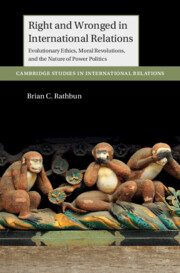 Right and Wronged in International Relations
Right and Wronged in International Relations Published online by Cambridge University Press: 29 July 2023
Brian Rathbun argues against the prevailing wisdom on morality in international relations, both the commonly held belief that foreign affairs is an amoral realm and the opposing By focusing on how states respond to being wronged rather than when they do right, Rathbun shows that morality is and always has been virtually everywhere in international relations – in the perception of threat, the persistence of conflict, the judgment of domestic audiences, and the articulation of expansionist goals. The inescapability of our moral impulses owes to their evolutionary origins in helping individuals solve recurrent problems in their anarchic environment. Through archival case studies of German foreign policy; the analysis of enormous corpora of text; and surveys of Russian, Chinese, and American publics, this book reorients how we think about the role of morality in international relations.
To save this book to your Kindle, first ensure [email protected] is added to your Approved Personal Document E-mail List under your Personal Document Settings on the Manage Your Content and Devices page of your Amazon account. Then enter the ‘name’ part of your Kindle email address below. Find out more about saving to your Kindle.
Note you can select to save to either the @free.kindle.com or @kindle.com variations. ‘@free.kindle.com’ emails are free but can only be saved to your device when it is connected to wi-fi. ‘@kindle.com’ emails can be delivered even when you are not connected to wi-fi, but note that service fees apply.
Find out more about the Kindle Personal Document Service.
To save content items to your account, please confirm that you agree to abide by our usage policies. If this is the first time you use this feature, you will be asked to authorise Cambridge Core to connect with your account. Find out more about saving content to Dropbox.
To save content items to your account, please confirm that you agree to abide by our usage policies. If this is the first time you use this feature, you will be asked to authorise Cambridge Core to connect with your account. Find out more about saving content to Google Drive.